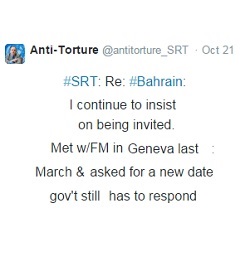The United Nations can only successfully address human rights issues if it has the full and honest cooperation of all states involved in its protection processes. This month’s meeting of the Third Committee of the U.N. General Assembly, a body tasked with monitoring the findings of the Human Rights Council and addressing human rights concerns as they relate to the General Assembly, shows how a state like Bahrain can participate in UN human rights bodies without actually cooperating with them. While the Bahraini delegation to the General Assembly claims to support international human rights oversight, its noncompliance with the UN Special Procedures indicates that it has no intention of honoring those promises.
الرجاء الضغط هنا لقراءة هذه الرسالة باللغة العربي
This week’s Third Committee meeting provided several member nations with a platform to criticize this non-compliant participation. The Czech delegation called attention to the Bahraini government’s cancellation of a trip previously scheduled with Mr. Juan Mendez, the Special Rapporteur on torture and other cruel, inhuman or degrading treatment or punishment. The delegation also asked the Bahraini government to “improve prison conditions and ensure adequate medical care for prisoners Mr. al-Demastani, Dr. al-Ekri and Professor al-Singace.” Dr. al-Singace is an academic and human rights activist whom Bahraini authorities jailed in 2010, subsequently denying him needed medical attention, while al-Ekri and al-Demastani are medical professionals who suffered arrest and torture after assisting badly injured protesters during the 2011 Arab Spring protests.
Attention shifted back to Bahrain later in the proceedings when Special Rapporteur Mendez explained his difficulties in scheduling visits with uncooperative governments, using Bahrain as an example. Both Switzerland and the European Union expressed concern over these developments, supporting the establishment of follow-up country visits as necessary to the rapporteur’s work; the EU delegation went so far as to ask Mr. Mendez to elaborate on the negative implications which these cancellations and postponements had on his ability to fulfill his office’s mandate.
As a participant in the interactive dialogue, the delegation from Bahrain took the opportunity to reaffirm “its keen interest in continuing cooperation with the various bodies of the UN and the Human Rights Council through the UPR mechanism and the various treaty bodies to which the kingdom is party.” An ADHRB report from February of this year, however, calls the Bahraini government’s commitment to the UPR mechanism into serious question. The delegation then supplied a non-response to Mr. Mendez’s stated difficulties in scheduling a follow-up visit, saying that the dates for any visits should be discussed through the appropriate bilateral mechanisms.
The Bahraini delegation attempted to end its statement on a positive note, detailing its commitment to human rights reforms by highlighting the government’s creation of the Office of the Ombudsman of the Ministry of Interior and the National Institute for Human Rights. The two organizations serve as “national preventive mechanisms” for the monitoring of human rights abuses, ostensibly corresponding to requirements set out in Article 3 of the Optional Protocol to the Convention against Torture. An ADHRB report released in August detailed the ineffectiveness of these institutions. In touting their establishment, the Bahraini delegation clearly meant to echo statements made by Switzerland, the EU and other delegations in support of strengthening international commitments to the Optional Protocol. As long as domestic Bahraini authorities torture and imprison prisoners of conscience like Dr. al-Singace and others, however, the effectiveness of any national preventive mechanisms on the part of Bahrain will be suspect. If it is truly serious in exercising its stated commitment to human rights reforms, the Government of Bahrain should listen to the advice of the Swiss and EU delegations and sign the Optional Protocol.
The work of international human rights advocates continues in and around formal Third Committee meetings. Yesterday, OHCHR, together with several permanent missions and a group of NGOs, sponsored a side-event on “The Role of Forensic and Medical Sciences in the Investigation and Prevention of Torture and Other Ill-Treatment,” launching the Convention Against Torture Initiative in the process. ADHRB encourages everyone concerned about human rights abuses in Bahrain and beyond to follow the important and evolving efforts of these international human rights bodies to monitor the abuses of noncompliant nations.
–
Peter Bogdanich and Eric Eikenberry are Advocacy Interns at ADHRB





